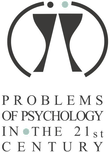"SOMETHING SIMILAR I’VE ALREADY LEARNED, THUS I EASILY WILL REMEMBER IT!": THE EASE-OF-PROCESSING HEURISTIC AS A SOURCE IN METAMEMORY JUDGMENTS UNDER PROACTIVE INTERFERENCE CONDITION
| Title | "SOMETHING SIMILAR I’VE ALREADY LEARNED, THUS I EASILY WILL REMEMBER IT!": THE EASE-OF-PROCESSING HEURISTIC AS A SOURCE IN METAMEMORY JUDGMENTS UNDER PROACTIVE INTERFERENCE CONDITION |
| Publication Type | Journal Article |
| Year of Publication | 2014 |
| Authors | Voloshyna, V |
| Journal | Problems of Psychology in the 21st Century |
| Volume | 8 |
| Issue | 2 |
| Start Page | 184-194 |
| Pagination | Continuous |
| Date Published | December/2014 |
| Type of Article | Original article |
| ISSN | 2029-8587 |
| Other Numbers | ICID: 1135343 |
| Keywords | ease-of-processing heuristic, metacognitive ability, metamemory judgments, proactive interference (PI) |
| Abstract | In line with some metamemory literature, people are unable to predict the influence of interference on their metacognitive ability to prognosticate future memory performance (Eakin, 2005). However, according to other researchers, there are certain circumstances in which an individual can predict the factors that restrict access to the target information in memory (Maki, 1999; Diaz & Benjamin, 2011). Henceforth, this study is aimed at investigating the ease of processing heuristics as a source of errors on the meta-level in terms of proactive interference (PI), as well as the conditions under which it is possible to avoid its negative impact on the accuracy of different types of metamemory judgments. To do this, we encouraged participants to make metamemory judgments (e.g., EOL, JOL) under the time pressure and without it (non-analytic and analytic groups) in two different conditions (interference and control). Our findings demonstrate that (i) fast metamemory judgments are based on ease-of-processing heuristics, which enhances the “illusion of knowing” (see Eakin, 2005); (ii) inferences during study allocation can diminish the effect of the “illusion of knowing” phenomenon. In addition, analytic inference leads to more accurate metamemory performance under PI condition. In addition, analytical metamemory judgments are more accurate under PI condition; also it should be concluded that, despite the fact that the primary source of information in making EOL judgments is ease-of-processing heuristics, in this process some other resources, analogical to JOL judgments, were involved. |
| URL | http://oaji.net/articles/2014/444-1420790218.pdf |
| DOI | 10.33225/ppc/14.08.184 |
| Original Publication | «ЧТО-ТО ПОХОЖЕЕ Я УЖЕ УЧИЛ, С ЛЕГКОСТЬЮ ЗАПОМНЮ И ЭТО!»: ЭВРИСТИКА ЛЕГКОСТИ ОБРАБОТКИ КАК ИСТОЧНИК ИНФОРМАЦИИ СУЖДЕНИЙ МЕТАПАМЯТИ В УСЛОВИЯХ ПРОАКТИВНОЙ ИНТЕРФЕРЕНЦИИ |
| Refereed Designation | Refereed |
| Full Text |
